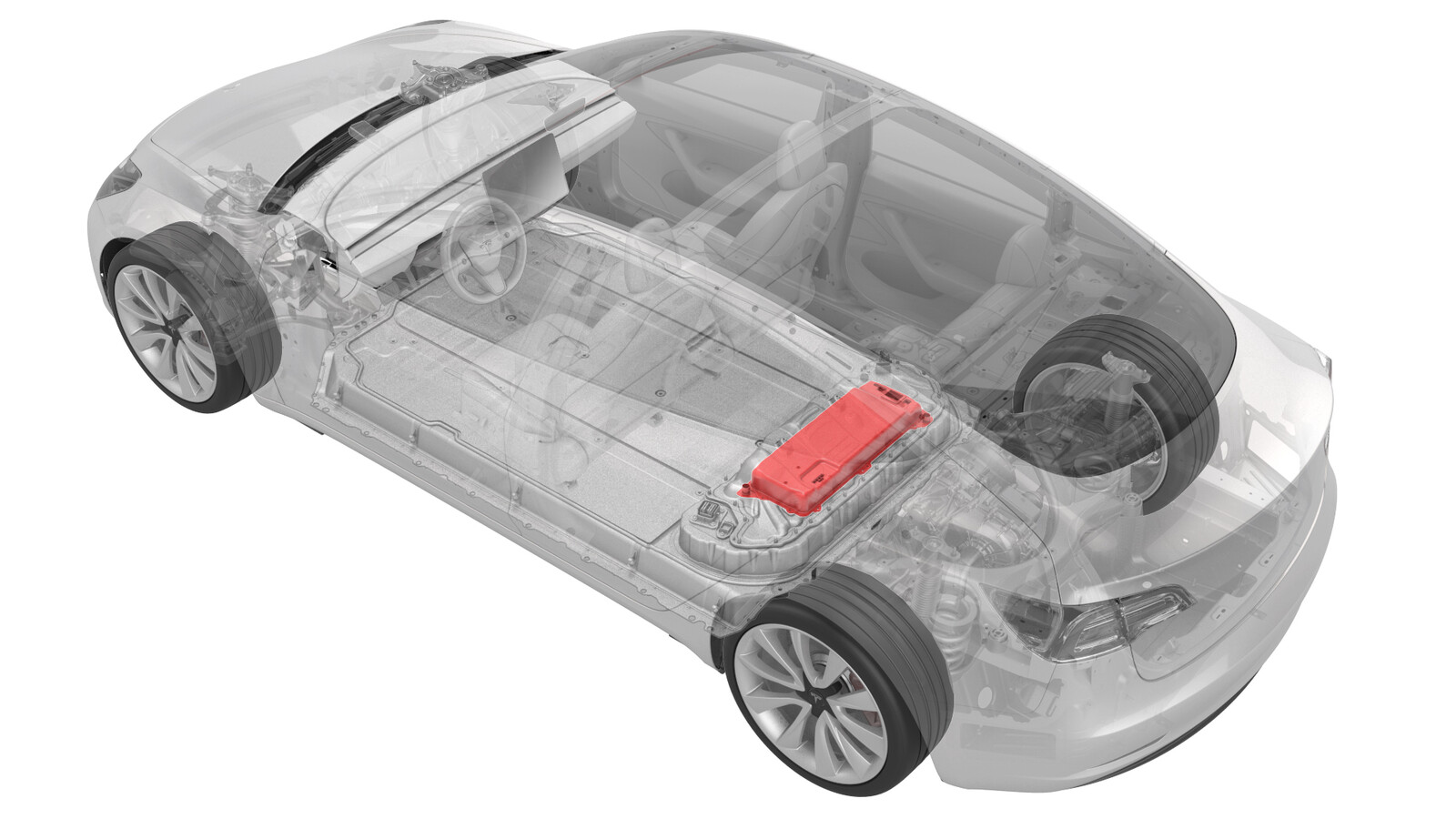Power Conversion System (Remove and Replace)
 Correction code
16301002
2.58
NOTE: Unless otherwise explicitly
stated in the procedure, the above correction code and FRT reflect all of the work
required to perform this procedure, including the linked procedures. Do not stack correction codes unless
explicitly told to do so.
NOTE: See Flat Rate
Times to learn more about FRTs and how they are created. To provide feedback on
FRT values, email ServiceManualFeedback@tesla.com.
NOTE: See Personal Protection to make sure wearing proper PPE when
performing the below procedure. See Ergonomic Precautions for safe and healthy working practices.
Correction code
16301002
2.58
NOTE: Unless otherwise explicitly
stated in the procedure, the above correction code and FRT reflect all of the work
required to perform this procedure, including the linked procedures. Do not stack correction codes unless
explicitly told to do so.
NOTE: See Flat Rate
Times to learn more about FRTs and how they are created. To provide feedback on
FRT values, email ServiceManualFeedback@tesla.com.
NOTE: See Personal Protection to make sure wearing proper PPE when
performing the below procedure. See Ergonomic Precautions for safe and healthy working practices.
- 2023-06-08: Corrected the step at the end of the Installation procedure to disconnect charger/LV maintainer rather than disconnecting 12V/LV battery.
Only
technicians who have completed all required certification courses are permitted to
perform this procedure. Tesla recommends third party service provider technicians
undergo equivalent training before performing this procedure. For more information on
Tesla Technician requirements, or descriptions of the subject matter for third parties,
see HV Certification Requirements. Proper personal protective equipment (PPE) and insulating HV
gloves with a minimum rating of class 0 (1000V) must
be worn at all times a high voltage cable, busbar, or fitting is handled. Refer to Tech Note TN-15-92-003, High Voltage Awareness
Care Points
for additional safety
information.
Remove
- Remove the power conversion system. See Power Conversion System (Remove and Install).
Install
- Perform a zero adjust of the Hioki resistance meter in preparation to measure resistances later in this procedure. See Resistance Meter (Zero Adjust).
- Remove the shipping plugs from the replacement power conversion system.
- Tilt the power conversion system and drain the shipping water into a coolant drain.
-
Refit the shipping plugs.
NoteDo not remove the plugs again until instructed.
-
Install the power conversion system.
See Power Conversion System (Remove and Install).
NoteBack to the current procedure after connecting the 12V charger/LV maintainer.
- With an assistant checking the power conversion system for leaks, top off the superbottle.
- Connect a laptop with Toolbox to the vehicle.
- In Toolbox, type "vcfront" into the search field.
-
Select the ODIN routine TEST-RESET_VCFRONTvia Toolbox: (link)via Service Mode Plus:
- Low Voltage ➜ Power Distribution ➜ Reset VCFRONT
- Mid Voltage ➜ Power Distribution ➜ Reset VCFRONT
-
Select the ODIN routine TEST_VCFRONT_X_THERMAL-COOLANT-AIR-PURGEvia Toolbox: (link)via Service Mode:
- Thermal ➜ Actions ➜ Coolant Purge Stop or Coolant Purge Start
- Thermal ➜ Coolant System ➜ Coolant Purge Start
- Drive Inverter ➜ Front Drive Inverter Replacement ➜ Coolant Air Purge
- Drive Inverter ➜ Rear Drive Inverter Replacement ➜ Coolant Air Purge
- Drive Inverter ➜ Rear Left Drive Inverter Replacement ➜ Coolant Air Purge
- Drive Inverter ➜ Rear Right Drive Inverter Replacement ➜ Coolant Air Purge
- Drive Unit ➜ Front Drive Unit Replacement ➜ Coolant Air Purge
- Drive Unit ➜ Rear Drive Unit Replacement ➜ Coolant Air Purge
NoteMake sure the vehicle is not in Drive.NoteThe test will last for approximately 10 minutes. Monitor and keep the superbottle topped off while the test is running. Coolant pump speeds can be monitored in Service Mode + (see Service Mode Plus), in the CAN Viewer submenu. If pump speeds stay above 6900 rpm, there is still air entrapped in the system; run a cooling system vacuum refill. - When the air purge is complete, top off the superbottle, and then install the superbottle cap.
- Disconnect the laptop from the vehicle.
- Power off the vehicle from the touchscreen.
- Remove the 12V charger from the 12V auxiliary battery terminals or disconnect the LV maintainer from the vehicle. See LV Maintainer (Connect and Disconnect).
-
Depending on the vehicle
configuration, choose one of the following:
- If the vehicle is equipped with a lead-acid 12V auxiliary battery, disconnect the 12V auxiliary battery negative terminal.
- If the vehicle is equipped with a Li-ion LV auxiliary battery, disconnect the LV battery connector from the LV battery.
- Inspect and put on PPE including the HV insulating gloves and leather over gloves.
- Release the bungee strap from the high voltage controller and rear RH seat headrest, and then lower the controller into the ancillary bay.
- Measure the voltage across the pyrotechnic battery disconnect mount points, and then install the pyrotechnic battery disconnect. See Pyrotechnic Battery Disconnect (Remove and Replace).
- Install the ancillary bay cover. See Cover - Ancillary Bay (Remove and Replace).
- Remove the leather over gloves and the HV insulating gloves.
- Install the 2nd row lower seat cushion. See Seat Cushion - Lower - 2nd Row (Remove and Replace).
- Connect 12V/LV power. See 12V/LV Power (Disconnect and Connect).
- Perform a software CAN redeploy. See Software Reinstall - Toolbox.
- After the software CAN redeploy is complete, remove the 12V charger from the 12V auxiliary battery terminals or disconnect the LV maintainer from the vehicle. See LV Maintainer (Connect and Disconnect).
- Install the cabin intake duct. See Duct - Upper - Cabin Intake (Remove and Replace).
- Install the rear apron. See Underhood Apron - Rear (Remove and Replace).
- Raise all windows and close all doors.
- Remove the vehicle from the 2 post lift. See Raise Vehicle - 2 Post Lift.